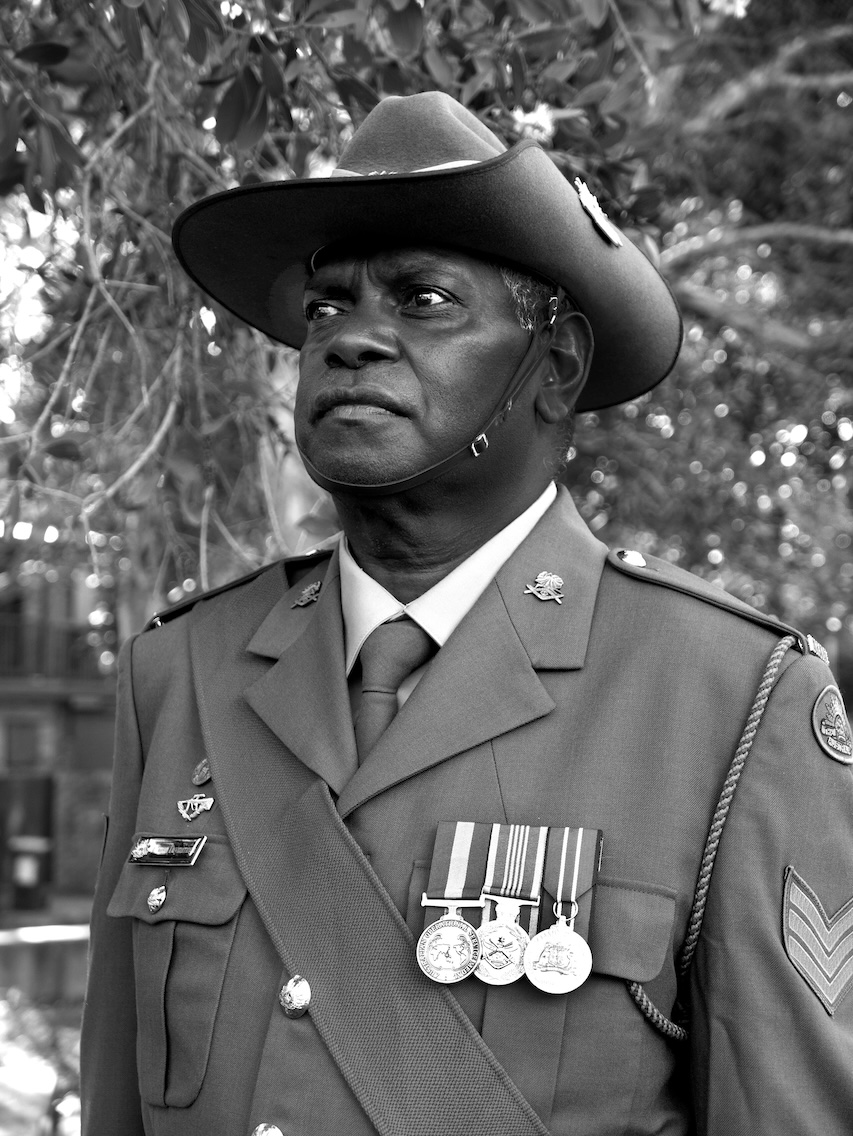Norman Daymirringu
Yolngu
Sergeant
Norforce
Regional Force Surveillance Group
Australian Army
Medals
Australian Operational Service Medal – Border Protection
Defence Long Service Medal
Australian Defence Medal
My name is Norman Daymirringu, and I’ve been serving for almost about 28 years now in NORFORCE; I’m now Sergeant and Patrol Commander in NORFORCE. My Elders taught me about the history of the WW2 Indigenous soldiers, so I had an understanding but didn’t know how I could become a soldier, too. I first learnt about NORFORCE when I was at my grandfather’s funeral, in 1999, David M Daymirringu who was a renowned Artist – whose artwork, ‘Mortuary feast of Gurrmirringu’ was used on Australia’s now-obsolete one-dollar note without his consent. At his funeral I saw people that looked like army soldiers, I seen all my Indigenous colleagues amongst them. They said ‘NORFORCE – everybody can join.’ They passed me one of entry of their forms and asked if I wanted to sign up – and I did. I went into training, and straight after that I went to a patrolling course, which I spent about a month in Darwin – that was all back in 1989.
It was amazing being a young digger in the army. It was my stepping-stone to be able to taught about challenging, encouraging and supporting myself – being able to learn how to push myself. It took me a while to become a leader in the army, but I managed to understand what it takes. I started focusing on my other Indigenous leaders in the army, like Tommy, Ian and Reginald Numamurdirdi – they became my inspiration – and taught me how to develop myself, take care of others, lead and respect each other in the army. I had good encouragement and support from my Elders and leaders.
I got promoted to Lance Corporal, and then a full Corporal and now I am a Sergeant. I have done all sorts of courses, small craft handle boat driver’s, car and truck too. I’ve been instructing and mentoring too. I then came army medic, which is a paramedic and I work with our patrols in the bush. I did manage a couple of non-indigenous fellows, they got dehydrated on a 40 degrees hot day, so I had to examine them, check their pulse, temperature, canulated them to give them fluid intravenously. I’ve saved about three of them so far. Once you come in the army, we are all green. Green brothers – it is not about if you are indigenous or non-indigenous.
I started playing the Yiḏaki along with the dancers performing. We have represented NORFORCE at the Opera House Victoria Barracks in Sydney and also in the Victoria Barracks and also in Canberra about three times or four times now. But in 2015, we chose the kangaroo dance and the emu dance to represent Australia at for the Gallipoli 100 anniversary commemoration of the fallen soldiers at the Lone Pine Cemetery in Turkey. We needed to remember our fallen Aboriginal and Torres Strait Islander soldiers who died there. So this was a significant performance. So, I took the hollow log from Ramingining and collected soils from the Australian War Memorial to pour into the soil at Lone Pine. It was the first time I had ever been out of Australia. We perform with our traditional clothing on. I put my white clay on, got my Yidaki, and played. It was quite special to touch the ground, we had goosebumps, we could feel the spirit of the soldiers. It was not only about showing the world through performing and showcasing our culture, it was also about honouring warrior spirit. After the smoking ceremony, I stood up and called, in my language, for the Warrior’s spirit to come back home. It was very spiritually moving for us all. That night in my dreams, I saw a man beside me; it was my Dad, and behind us, there were lots of soldiers. My Dad said, to me, ‘son, when are we going back to home?’ I jumped out of bed and burst in tears. It was really emotional for me, and I understood what my Dad was saying. It was about the part of the ceremony, not when we put soil from Australia into the ground at Lone Pine, but when we collected some soil from Lone Pine. This soil was where their blood was shed, so by bringing it back we knew their spirits could return with us to Australia. We had done this our cultural way. The Chief of Army stood up and shook my hand and said to me, the Yiḏaki should be played at every ANZAC event parade. It felt like we had opened a door, for all indigenous fellows right across Australia. I have also played at ANZAC Day services in 2016 at Canberra War Memorial with a military piper.
I’ve been awarded a Churchill Scholarship, and I will collaborate with Rangers from across the world in countries such as Africa, Zimbabwe, Nepal, Papua New Guinea, Mexico, the USA, and Kenya. That’s going to be my next big trip.
